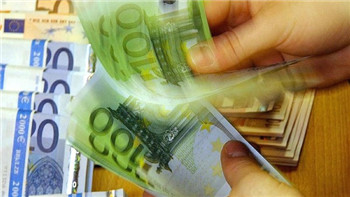(单词翻译:单击)

John Cryan, co-head of Deutsche Bank, is not a man given to hyperbole. A couple of weeks ago, however, he made a comment about money that might make ordinary mortals blink.
德意志银行(Deutsche Bank)的联合首席执行官约翰克赖恩(John Cryan)不是惯于夸张之人。然而,不久前,他的一番有关货币的话却可能让普通人感到惊讶。
Speaking on a financial technology panel at Davos, he cheerfully predicted that in a decade’s time cash probably won’t exist. Yes, you read that right: all those grubby greenbacks and tattered euro bills in your wallet are heading for the dustbin of history. “There is no need for it,” Mr Cryan declared. “It is terribly inefficient and expensive.” Can we believe him? Not if you look at the data.
在达沃斯的一场金融技术小组讨论期间,他轻快地预测道,10年后现金很可能将不存在。是的,你没看错:你钱包所有那些肮脏的绿背美钞和破烂的欧元票子即将进入历史的垃圾箱。“没人需要现金,”克赖恩宣称,“它的效率非常低,使用成本特别高。”我们能相信他的话吗?不能——如果你看看数据的话。
It is true that in recent decades, as electronic finance has taken hold, our use of cash has been declining. According to the Bank for International Settlements, outstanding cash in circulation was 7.9 per cent of gross domestic product in the largest 19 economies in 2014, the most recent available data; in 2010 it was 8.4 per cent.
没错,近几十年,随着电子金融的兴起,我们使用现金的场合越来越少。根据国际清算银行(BIS)的数据,2014年(可获得数据的最近年份)),19个最大经济体的流通中现金余额为国内生产总值(GDP)的7.9%;2010年则为8.4%。
But what is striking is not the fact that cash use has declined but how slow — and uneven — this trend has been. Indeed, if you look at the total volume of cash in circulation, rather than cash as a percentage of GDP, Sweden is the only leading western economy where it has recently declined. Elsewhere it has been rising. In Japan, Switzerland, the eurozone and the UK, the ratio of cash to GDP has actually grown.
但引人注目的不是现金使用减少的事实,而是这一趋势的发展是多么缓慢和不均衡。的确,如果你看看流通中的现金总量而不是现金与GDP的百分比,瑞典是近年流通现金总量减少的唯一主要西方经济体。其他国家的流通现金一直在增加。在日本、瑞士、欧元区和英国,现金与GDP的比率实际上有所增加。
In Japan today cash in circulation is more than 20 per cent of GDP, while in Switzerland the ratio is above 10 per cent. In the UK, this ratio is 3.7 per cent, higher than in 2010. Those smartphone bank accounts and innovations in blockchain technology might look flashy but they have not killed off paper money. Yet.
在日本,如今流通中现金超过GDP的20%,在瑞士,该比率超过10%。目前,英国的该比率为3.7%,高于2010年。那些智能手机银行账号和区块链(Blockchain)技术创新,看起来或许很时髦,但它们并没有消灭纸币。至少到现在为止还没有。
Why? It is partly down to consumer habit, coupled with a popular mistrust of banks in countries such as Japan that have suffered financial busts. Another factor is that millions of poor households, even in America, still do not use banks. Criminals, terrorists and tax-evaders also tend to use cash for their operations, particularly large denomination bills.
为什么?部分原因在于消费者习惯,同时,在日本等遭遇过金融崩溃的国家,很多人不信任银行。另一个因素是,数以百万计的贫穷家庭——即使是在美国——仍然不使用银行服务。犯罪分子、恐怖分子和逃税者也倾向于使用现金,尤其是大面额钞票。
The other factor, though, is the behaviour of central banks themselves. One unintended consequence of super-loose monetary policy is that it has reduced incentives for consumers to store their money in banks. With low interest rates in many developed economies, and negative rates in places such as Switzerland and Japan, savers are likely to find they receive negligible returns or may even be penalised with charges. This may be boosting cash usage, too, although nobody knows exactly to what degree.
不过,还有一个因素在于央行本身的行为。超宽松货币政策引起了一个意想不到的后果,那就是它降低了消费者把钱存入银行的动力。由于许多发达经济体实行低利率,瑞士和日本等地执行负利率,储户可能会发现他们得到的回报微不足道,或者甚至可能被收费、受到惩罚。这或许也在加大现金的使用,尽管谁也不知道具体程度。
But the really interesting thing is what happens in the next few years. For there are at least three situations bubbling that could yet change this dynamic and prove Mr Cryan at least partly right.
但真正有意思的将是未来几年发生什么,因为至少有三件不断升温的事情可能改变当前局面,证明克赖恩至少是部分正确的。
First, and most obviously, digital and cyber finance is spreading rapidly. Second, some governments are belatedly realising that reduced use of cash is helpful in terms of security and fighting crime. After all, drug dealers and Islamist militants generally do not use bank accounts or mobile payments. So one way to cut terrorism and crime might be to withdraw the big denomination bills they prefer. The European Commission is already pondering this: it announced this week that it is looking at whether to curtail the use of 500 notes. This seems a sensible step, one that other governments should consider.
第一、也是最明显的是,数字和互联网金融正在快速发展。第二,一些政府姗姗来迟地意识到,减少现金使用有利于治安和打击犯罪。毕竟,贩毒者和伊斯兰主义好战分子一般不使用银行账户或移动支付。所以,取消他们所青睐的大面值钞票,或许是打击恐怖主义和犯罪的一条途径。欧盟委员会已在考虑这一点:它最近宣布,正在研究是否减少500欧元纸币的使用。这似乎是明智的措施,其他政府也应该考虑。
The third factor that could influence cash usage in the next few years is, again, the stance of central banks themselves. As rates turn negative, central bankers in places such as Switzerland are scrambling to prevent consumers dashing into cash as this not only makes financial transactions less efficient but also makes monetary policy less effective. After all, if people hold physical cash — which, unlike a bank account, is not directly affected by negative rates — central bankers have less control.
第三个可能影响未来几年现金使用的因素,再次在于央行本身的姿态。随着利率进入负区间,瑞士等国的央行官员们正想方设法阻止消费者争抢现金,因为那不但降低金融交易的效率,而且会降低货币政策的效果。毕竟,如果人们持有实物现金——跟银行账户不同,它不会受到负利率的直接影响——那么央行官员的控制力将会减弱。
So far, nobody has seriously tried to ban cash to make negative rates more effective. But the idea has been floated by people such as Andy Haldane, Bank of England chief economist, and Kenneth Rogoff, the Harvard economist. The idea still seems far-fetched — but the longer rates stay low or negative the more “unthinkable” proposals could become mainstream and (if nothing else) prompt official support for electronic finance.
到目前为止,谁也没有为了让负利率政策更有效而真正尝试禁用现金。但英国央行(BoE)首席经济学家安迪霍尔丹(Andy Haldane)和哈佛大学(Harvard)经济学家肯尼斯圠格夫(Kenneth Rogoff)已提出了这一构想。它看来仍然遥不可及——但是,利率保持在低位或负值区间的时间越长,“难以想象的”提议进入主流的可能性就越大,至少会促使官方支持电子金融。
It may take longer than a decade for Mr Cryan’s prediction to come to pass; but it would be dangerous to discount it. For better or worse, the nature of money is changing. And who knows? If this revolution helps curtail tax evasion and terrorist finance — and makes our lives more convenient along the way, too — it might turn out to be one of the better developments to have emerged from the finance industry in recent years.
克赖恩的预测可能需要比10年更长的时间才能变为现实;但忽视它将是危险的。无论好坏,货币的性质正在变化。谁知道呢?如果这一革命有助于抑制偷税和恐怖主义融资——同时给我们的生活提供更多便利——它或许是近些年来金融业出现的较好动态之一。


